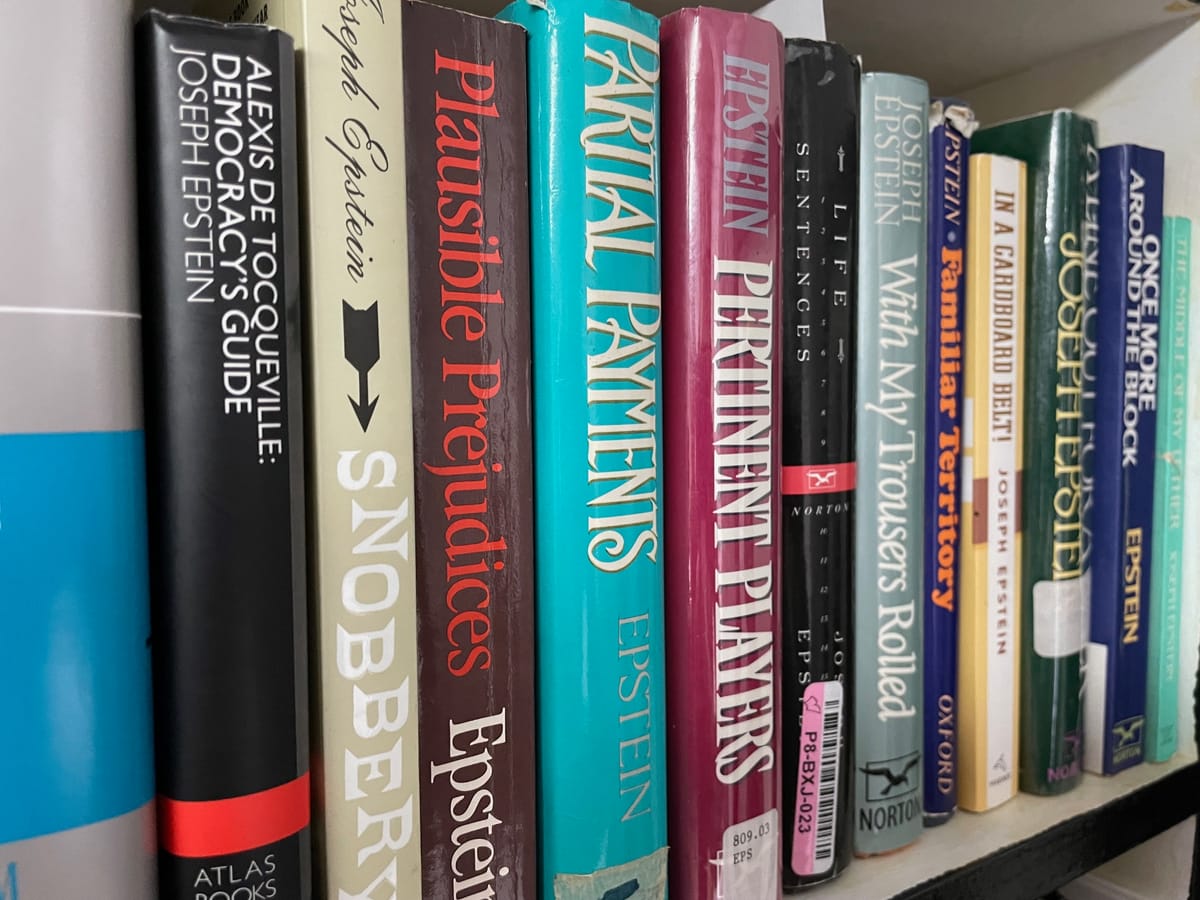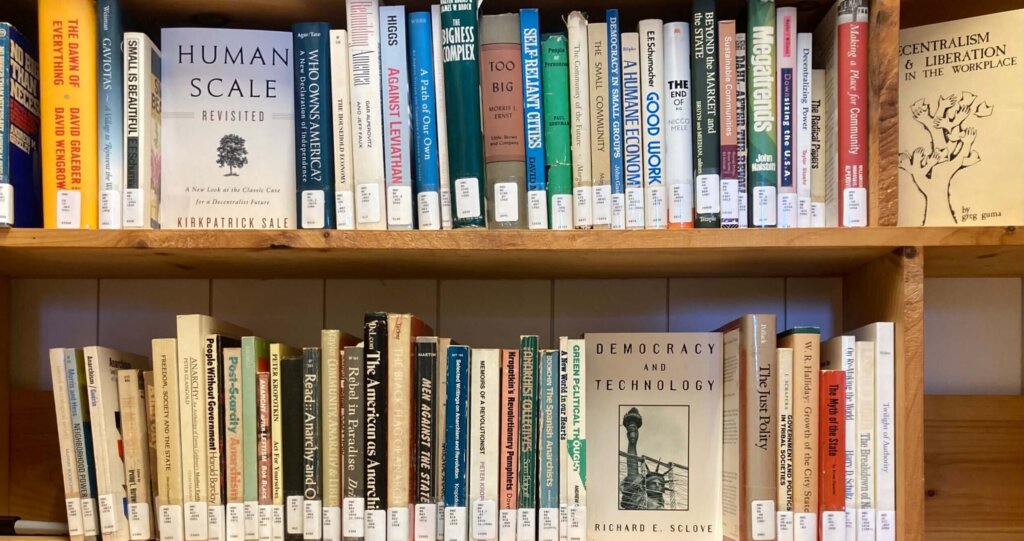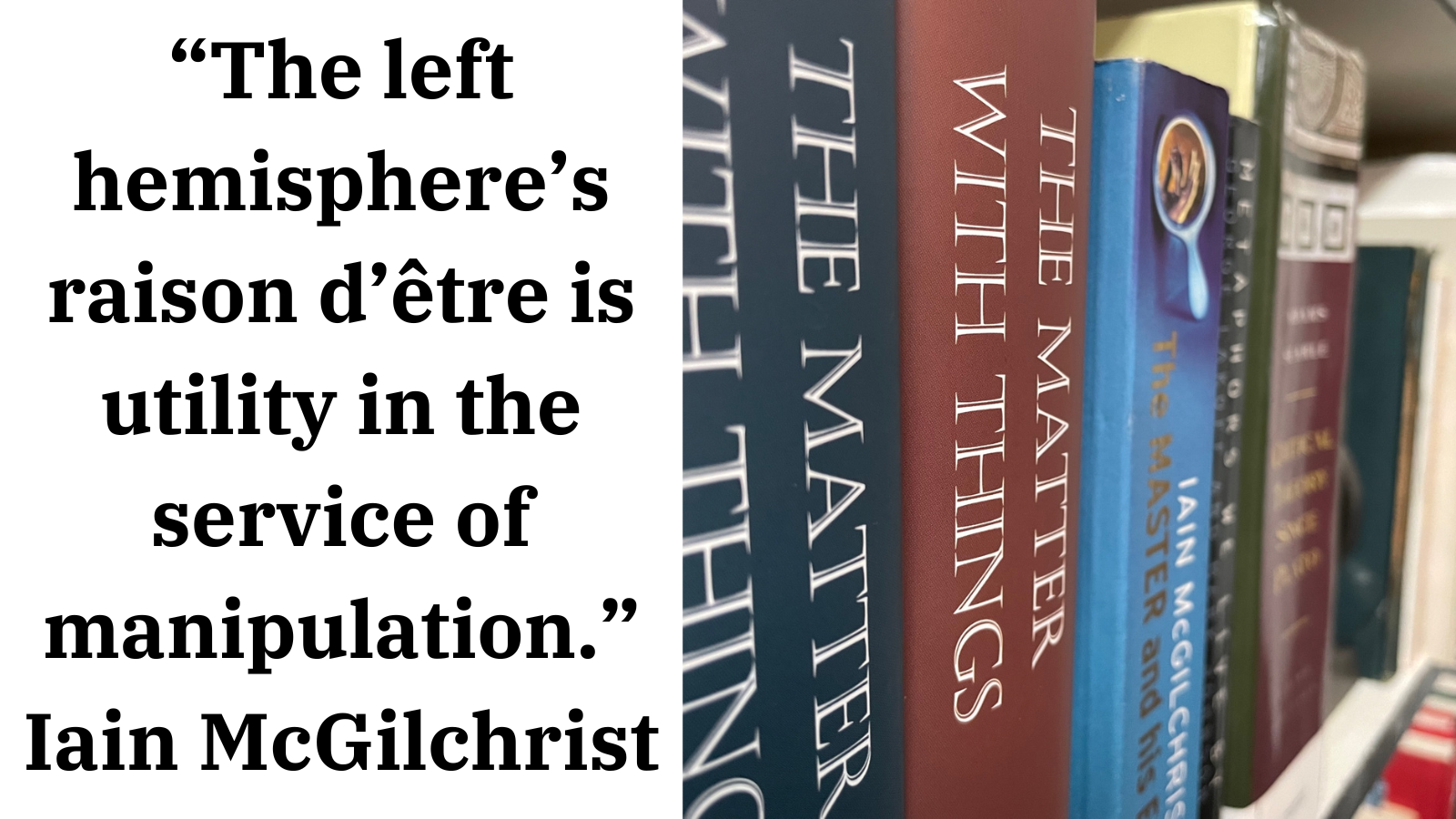Scrolling Blog: February 2024

February 29, 2204
I Loathe the Republican Party
But Thank Goodness for the Republican Party
This issue is so important, I'm not inclined to much care what kind of politics or demagoguery or other roguery is driving the opposition, just as long as this measure is exposed and stopped. It's that important.


Fadiman Revisted . . . and Revisited and Revisited
I like admirations that seem wholly disproportionate to the subject.
I'm not talking about the instant canonization of criminals. I'm also not talking about our culture's nauseating tendency to beat the living heck out of every fad, nor about our culture's tendency to go saccharine on anything beautiful, nor about our culture's inability to keep laudatory words within their original definition (e.g., calling everyone who does his job a "hero").
I'm talking about an earnest and elaborate admiration for something that, though worthy of respect and attention, wouldn't seem to merit such earnestness and elaboration.
Such is the 7,500-word essay that The Lamp published recently about Clifton Fadiman's A Lifetime Reading Plan (which is out of print, but you can find a revised and expanded version still in print here). I highly recommend it. It was good enough to get me to take my copy off the bookshelf and start reading entries again. I had forgotten how good it was.
Two Asides
The Lamp is a Catholic journal. Fadiman was close friends with the godfather of the Great Books program, Mortimer Adler, and dedicated A Lifetime Reading Plan to him. Surprisingly, the essay doesn't mention that Adler converted to Catholicism at the end of his life.
The Lamp has run a few (two? three?) essays by the great Joseph Epstein. Many years ago, Epstein wrote an unflattering portrait of the Great Books project, especially its "Synopticon" and its editor, Adler. Epstein's portrait of Adler was, by today's standards, civil, but by Epstein's standards, kinda vicious. I remember reading it and thinking, "This level of negativity is out of character for Epstein. He must've loathed Adler."
Mr. Payne, incidentally, seems to line up with Epstein's negative assessment of the Great Books project, especially the Synopticon, which he hilariously refers to as "an exercise in subclinical autism."
This two-volume work inventories one hundred and two Great Ideas, from Angel to World. The entry for each Great Idea contains references to passages in the Great Books where it is mentioned or discussed. It is hard to imagine this work being put to use by either laymen or scholars. If a layman is interested in the topic of Love, for instance, painstakingly searching up every mention of it, great or small, from Homer to Freud, seems like a less efficient use of time than reading a general overview, like de Rougemont’s. On the other hand, a scholar who is studying Plato’s idea of love will need years of philological work which Great Books in translation cannot give him, and will need to hone in on certain key passages and their controversies, such as Diotima’s ladder of ascent, which the Synopticon, in its completionist, all-inclusive grasp, will not differentiate. This index, the labor of seven years, today seems little more than an exercise in subclinical autism, one which even proponents of Great Books education never use. The Synopticon’s lack of educational purpose did not stop the Encyclopædia Britannica from commissioning an army of salesmen to travel around the country teaching people how to use it.

February 28, 2024
A Rogan Briefly

February 27, 2024
Some Epstein

February 26, 2024
Monday Column

February 25, 2024
For us fatigued Christians
"The one who willingly lets himself be led by God walks on a very straight path. He saves an infinite amount of time and trouble. Most Christians invest a great deal of their energy in resisting God. As soon as we stop struggling, an unbelievable amount of energy is released." Wilfrid Stinissen
February 24, 2024
Quote of the Day

February 23, 2024
BYCU
This week's column is a bit lame, I fear (though that 5-second video is worth watching). There's simply a dearth of decent drinking news, exacerbated by Internet connection problems over the past 12 hours. Enjoy . . . or not.

February 22, 2024
Can We Just Agree Google is Evil and Move On?

The problem is, all searches are now Google results (even browsers like "Duck Duck Go" use Google as its engine). The only "major" non-Google browser is Brave, which is what I use, but it's not as efficient as Google. I use it when I want to have a small chance of getting search results that aren't molded by Hudge and Gudge's hands.
Economic Freedom is the First Freedom
This is a fundamental truth that many people don't appreciate.
We need food, clothes, and shelter to survive. Until those elements are addressed, nothing else matters. If our freedom to pursue survival is interfered with, our other freedoms suffer.
It's that simple.
If you rely on someone else for survival, you are controlled to some extent, which means less freedom.
If someone else can interfere with your survival, that person can interfere with your other freedoms. If he tells you, "If you say X, Y, or Z, you won't be allowed to buy A, B, or C," you are less likely to say X, Y, or Z.
The other freedoms mean nothing if your economic freedom isn't in place.
Economic freedom comes first.
An exclusive centralized digital currency will kill economic freedom. If we have no hard money, the central government will know every economic transaction and can prohibit any type of transaction, and can prohibit people from engaging in transactions based on how they behave.
You oppose vaccines? Then you can't buy a house.
You think the vaccine originated in a lab? No car.
You say mail-in ballots are fraught? Then you can't buy alcohol.
You support Trump? Well, you just lost your digital wallet altogether, creep.
We know the federal government is already censoring speech. What makes us think it wouldn't use the far more effective means of simply killing people's economic freedom?
To be honest, if I had to choose between writing this blog and being allowed to travel or buy groceries without restrictions, I'd abandon the blog. Economics is prior to speech.
Sound the alarm. If this article is accurate, an Orwellian world is coming fast. It'll all be done for the sake of the children, of course, but Orwellian nonetheless.

February 21, 2024
The Decentralist File
I grow more tired of online reading every day.
It is by nature hard (something about the pixels and how our eyes work), but then the publications need to generate revenue, so they gum up access with pop-up screens and username requests, then gum up the prose with more pop-up screens and advertisements, many of which flash or change colors and otherwise punch you in the ocular to get your attention.
It's 100% understandable: Without revenue, it's hard for a publication to pay writers, and if writers don't get paid, they won't get good prose and, instead, you're stuck with the kind of drivel you find at TDE.
But then I come across something that makes it all worth it.
Like what I found last night: The Decentralist Files. It's hosted by the Schumacher Center (named for E.F. Schumacher, whose A Guide for the Perplexed ranks in my Top 10 books of all time . . . James Schall put it on his list of eight books someone should read if he wishes to pursue the highest things).
The files are maintained by John McClaughry (featured in this short Bill Kauffman essay) and, I believe, feature a trove of "localist" writings. "Decentralism" isn't the same thing as "localism," but they're correlated, much like cutting processed food and sugar is correlated to eating more simple meats and vegetables: Cutting out sugar is "decentralizing"; adding meats/vegetables is "localism."
Stretching from Lao Tzu through Wendell Berry, the Decentralism File’s authors include Jane Jacobs, George Kennan, Paul Goodman, Norman Mailer, Robert Nisbet, and unexpected communists (Rosa Luxemburg!) and anti-communists (Richard Nixon!). The New Left Students for a Democratic Society’s Port Huron Statement is here, as are manifestoes from Plaid Cymru of Wales and the Cornish Nationalist Party.


February 20, 2024
Censorship USA
The current Tucker Carlson interview is jaw-dropping.
I told a friend last night, "It was like the Deep State developed this internal logic and ran with it to extreme degrees, crushing the most basic freedom in the American tradition. I kind of imagine a few of the better-souled employees waking up now and thinking, 'Did we just do what I think we did?!?!?' Almost like people waking up on the lawn the morning after a big party and thinking, 'Oh man, what were we doing!?'"
Of course, my imagination is kinda ridiculous. First, there probably aren't any "better-souled' employees within the Deep State. Second, it assumes the revelers ever sober up . . . i.e., give up their self-serving lust for control and power, which, this interview makes clear, isn't happening. The censorship continues.
The interview is an hour long. Please, listen to it or, if you only want to dedicate three minutes to the subject, read my ten-point thumbnail sketch, which I think captures the essence of the interview.

February 19, 2024
Hanging Out is a Rebuke to the Left Hemisphere
America has a crisis: Young people aren't wasting enough time with one another. The result? Depression, suicide, and general malaise are up. Happiness is down.
I've long chided my kids, especially my daughters, for making "hanging out" a priority. In my left-hemispheric world, hanging out serves no purpose so it's not important.
I was terribly wrong. It's because hanging out serves no purpose that it is important.
To my credit, I've always known that. It's a central tenet of James Schall's The Unseriousness of Human Affairs, so I was never a complete jerk about it, but I nonetheless suggested to my kids that socializing should be pretty far down the rungs on the ladder of priorities.
But in a left-hemispheric culture, the act of hanging out with friends is incredibly important.

Friends are useless. Friends aren't there to be manipulated. Friends, therefore, are a rebuke to the left hemisphere, unless you are "social networking," in which case, you're a traitor to humanity (committing what T.S. Eliot called the "greatest treason": doing the right thing, for the wrong reason).
Hanging out, therefore, is a form of counter-conduct.
Counter-conduct, remember, is any conduct that defies the left hemisphere. The left hemisphere is so obnoxious and powerful, you can't beat it down too often.
And it doesn't even need to be difficult. You can simply chill out with a few friends.
The fact that Americans refuse (are unable to bring themselves) to hang out with others has risen starkly in the past forty years? It's just more evidence that the left hemisphere is getting more powerful, picking up steam in this era of late-stage left hemispherism.

February 18, 2024
The Great Man is Coming to a Neighboring Town
I had dinner with a friend last night who told me he has been invited to have lunch with McGilchrist while he's in town. He'd love to invite me, of course, but it's not his invite to give, and I've never met the person whose invite it is. Sigh.

The Systematic Ism We Must Eliminate

February 17, 2024
Localism and the Importance of Laboratories
If localities have self-determination, it results in a country full of mini-laboratories that allow us to figure out what works and what doesn't.
Granted, in the localities that practice oppression and hatred, things will be miserable, but at least people can leave. If enough people leave, the people who stay behind will become marginalized and poor and, in general, suffer. Everyone else can then see the terrible results from that laboratory and do something else.
If we don't give localities self-determination, instead forcing one flavor on the entire nation, we don't get all these laboratories. If we adopt a model that leads to suffering and deprivation, the entire nation is screwed.
The entire nation could become Portland.

February 16, 2024
BYCU
Britain is increasingly turning to wine and the French are increasingly turning to beer.
Those hard feelings from the Hundred Years War die hard. "If the French are drinking beer, we'll drink wine."


The French, btw, are experimenting by brewing beer with grapes and using wine barrels. The author speculates they might churn out a wine-beer blend that revolutionizes the market. We'll see.
February 15, 2024
A Promising New Substack
Daily poetry from the great Joseph Bottum, a man who eschewed the literary life for, well, the real literary life, moving from NYC to South Dakota to live among his roots, in peace, where he can collect his thoughts and write poetry.
I subscribed just this morning. I think it might be a great way to learn about appreciate poetry more. As many TDE readers know, I've long been a hypocrite on things poetic: I write about how great poetry is, but I scarcely understand it. Then again, maybe we aren't meant to "understand" it, at least not in my left-hemispheric way of thinking.
Anyway, enjoy . . . or not. Based on the first installment I received, it's going to be great.

His account of that mythopoesis is aided enormously — turned nearly into an incantation prayer — by the rhymed two-stress lines of the poem and its forced dactyls. The meter quickly becomes artificial, standing outside the natural words to become the kind of musical chant we know from nursery rhymes and counting games.
The first lines teach us how to read the poem’s dimeter, with its hints of the stresses of Anglo-Saxon alliterative verse: “CHRÌST of His GÈNtleness / THÌRSTing and HÙNgering, / WÀLKED in the WÌlderness.” And with that stress pattern established, we know how to hear such lines as “GRÈAT rats on LÈATHer wings / ÀND poor blind BRÒken things.”
A Supposed Celebration of Open Marriage
Don't Judge a Book by Its Cover
I know nothing about this book except what I read in this review. If the reviewer is honest, the publisher isn't. Of course, the publisher is Doubleday, which is probably about as mainstream (corporate, legacy, establishment) media as you get, so it shouldn't surprise me that its book cover appears to misrepresent the book's contents.
The book cover says it's a sexy romp. The book is a sexy death march.
The review is itself pretty racy, so you're forewarned, but it boils down to one essential point: The autobiographer has been miserable in her open marriage for decades but keeps doing it and, though admitting the sad details, can't see the sad whole.
The husband, meanwhile, has been having a great time.
It's no wonder the book cover lies about the contents. The contents are a repudiation of the idea that traditional mores are mere societal constructs. The natural law is written on the heart, which is then transmitted through the generations and centuries. We can jettison the transmission, but the initial prompting is still there: on the heart. In our human natures. We reject the transmission (the tradition) at great peril, as this woman's tortured existence shows.

Aside
I liked this brief observation by the reviewer:
To the friends who have confided in me or declared via social media that they are in open marriages, my response has always been “good for you!” If that’s what works for another person, if they are happy, then, as a member of a tolerant, pluralistic society, what else can I offer? As a religious person, a Catholic no less, I know that I am often on the receiving end of such tolerance, and I’m glad to reciprocate when given the opportunity.
I've long felt that way. Would I rather be a Catholic in a woke culture or a Catholic among the Klan? It's a tough choice, and I think I'd pick "Catholic among the Klan" because the Klan, though it hated Catholics, largely left them alone. The woke mob doesn't.
That being said, our culture isn't full-on woke . . . yet (and I think the tide is turning against it, starting with our stand-up comedians). We are still in a culture that emphasizes a tolerance born of slopping thinking, and it's unfortunate, but it is tolerance and that results in no one harassing me for my Catholic faith, and I appreciate it.
February 14, 2024
Married Men Can't be Priests
From Leviticus 21

Critique of Localism
This is a frustrating interview.
The champions of localism, Front Porch Republic, interview an enemy of it, Trevor Latimore (author of Small Isn't Beautiful).
It's a cordial exchange, with interesting arguments/points by both sides, but Latimore's position seems to gel around this simple point: Yes, central governments can suck, but local governments can suck, too.
FPR never asks the obvious point: Well, if your local government sucks, you can move a few miles down the road and try a different local government. If your national government sucks, you're out of luck unless you want to emigrate to another country. Both are unpleasant, but surely, moving to a new country is much, much more unpleasant.
In response to Latimore's position that centralized power is better because, citing J.S. Mill, "local despots" are close and, therefore, worse, the interviewer doesn't counter with the obvious point: "Is centralized power further away? It may have been further away in Mill's time, but in today's centralized panopticon of the Internet, digital currency, and the Homeland Security Act? Centralized government is creeping closer and closer."
Moreover, it's spreading at the same time. Americans can't even emigrate to Canada anymore to escape it, and Western Europe isn't an option either. The centralized American state's preferences are spanning the globe while at the same time creeping closer.
Interesting Aside
Latimore distinguishes between "perfectionist localists" and "consequentialist localists."
In my book I show that there are many different kinds of localism. I hesitate to paint Front Porch Republic with too broad a brush, but I think it would be fair to say that many of its (localist) readers are communitarian or classically republican in their localism. There is a romantic strain as well. In these forms, localism becomes associated with human flourishing and a particular vision of the good life. These are perfectionist views.
There is another kind of localism exemplified by the American Enterprise Institute’s (AEI) Localism in America: Why We Should Tackle Our Big Challenges at the Local Level. That form of localism is consequentialist rather than perfectionist; for the AEI crowd, localism should be adhered to because it helps solves problems. It says nothing about the good life. Here I’m really just rehashing a major divide in moral theory (consequentialism vs. perfectionism), but it maps well enough onto two very different strands of localism.
That "major divide" in moral theory is nothing less, it seems to me, than the "major divide" between the hemispheres. The left hemisphere looks at consequences and the right hemisphere looks at "perfectionism" (or, put in less condescending terms, "flourishing" or "acting consistent with human nature").
This, in turn, laps into the Taoist value of wu-wei: trying without trying. We shouldn't try to achieve, X, Y, and Z. We should simply try to do what is right (what is consistent with flourishing, acting in accord with our natures), moment to moment, and X, Y, and Z will follow . . . or not, but the results aren't are concern. A mind that isn't occupied with results is non-left hemispheric, and that's a thing to be cultivated.

Ash Wednesday
Or Valentine's Day.
Or, in my case, "The Day I Saved $75 on a Restaurant Bill Since Valentine's Day Fell on Ash Wednesday."

My software autocorrected "mortification" to "fortifications." I'm glad I caught it, but I'm not sure it would've been wrong.
February 13, 2024
Study Checks Left Hemispheric Assumption that We Don't Need Handwriting Anymore
The left hemisphere tends to see an obvious "truth" and run with it, especially when it comes to technology, often dismissing (ridiculing) the Luddites who sense something might be wrong and suggest we tread cautiously. In the modern world, the left hemisphere wins and we plow forward, then later we return and pick up through wreckage and try to fix things (often with more left hemispheric approaches, thereby making them worse).
When the Common Core State Standards were introduced in 2010, they explicitly referenced learning keyboard skills in grades 3 through 5. The standards require fourth graders to type a full page in one sitting. As a result, cursive was largely abandoned in most school districts.


February 12, 2024
Monday Column
I want to point out: This essay is conjecture.
In a way, I "work backward" from a lifetime of reading and admiring Merton's writings, combining them with biographical details, adding my understanding of Gnosticism and the Hemisphere Hypothesis, and coming up with this explanation of the confusing man that was Thomas Merton. I think it's a solid explanation, but since we're dealing with spiritual (and philosophical, psychological, historical matters, not to mention the inner workings of a man's soul, which is something no person can know), it is still conjecture.
But even if I'm wrong here about Merton, it provides a useful framework for understanding the rise of Gnosticism in modern culture.

February 11, 2024
Goodness Gracious, Russell Brand is Talented and Funny
He's absolutely on fire in this segment. I was laughing and getting angry at the same time. I didn't even know such a thing was possible.
Something for Sunday Morning
February 10, 2024

The Old NFL Has Dominated the Super Bowl
Or Has It?
The National Football League and American Football League started playing the Super Bowl in 1966. Since that time, the NFL teams (which include the Steelers and Colts) have won 36 times. The AFL teams have won 19 times (expansion teams have won twice).
That's 65%, which is pretty dominant.
The problem is, the old NFL had 16 teams (the AFL: 10), which means, based on random odds, the old NFL teams would've won 62.5% anyway, so no big deal.
What is interesting, though: The old NFL teams did dominate the Super Bowl for the first 35 years (until the Tom Brady era). The old AFL teams won only nine games (and without the Raiders' three championships, the number of AFL victories would've been wholly dismal).
February 9, 2024
BYCU
This one arguably has the best collection of drinking stories I've ever assembled in one edition.

[T]he Saudis only introduced the alcohol ban in 1952, following the murder of Cyril Ousman, the British vice-consul, who was shot dead by a Saudi royal at a party in 1951 after he refused the prince more drinks. It was a huge public embarrassment for the country’s rulers, laying bare the drinking culture in elite circles, somewhat at odds with their pious exhortations of religious observance.
February 8, 2024
McGilchrist at First Things

February 7, 2024
I Went to a Lecture by Joseph Epstein Last Night

The great writer seems like a great man. At 87, he's as charming as his prose. Toward the end, he said he's 87 and "enjoys it here." He's in no hurry to leave. Sad and touching at the same time: so much gratitude even as the sand is draining quickly from the hourglass.
He has written his autobiography, which is slated for hardback release in April.
Kind of interesting: It's available now in Kindle format. It makes sense, of course: Digital is much easier to produce than hard, but I guess I never noticed that new books were issued on Kindle months ahead of the hardback releases.
Flotsam
A new feature released today: Flotsam. I don't know if it'll become a regular thing. Let me know if you like it . . . or not.

February 6, 2024
The Doors
It hadn't occurred to me that one of my favorite bands never sold out to Madison Avenue. I also didn't realize that it was because one member, John Densmore, fought to make sure it wouldn't happen. This essay at The Spectator is one of the best things I've read this year: fun, stylish, interesting.

February 5, 2024
Austin Today

February 3, 2024
No Outside the Modern Limits Newsletter
I've been in Austin, Texas this week so blogging has been a little light and I couldn't put together a newsletter. Regular programming returns next week.
Today, I offer this paean to seed catalogs.

Groundhog Day
Instead of BYCU
A splendid bio optic of one of the twentieth century's degenerate literary drunks.

February 1, 2024
The Worst Month of the Year is Over. If You Made It, Congratulations.
Today, Joe Serwach weighs in with a nice piece about Yogi Berra.









